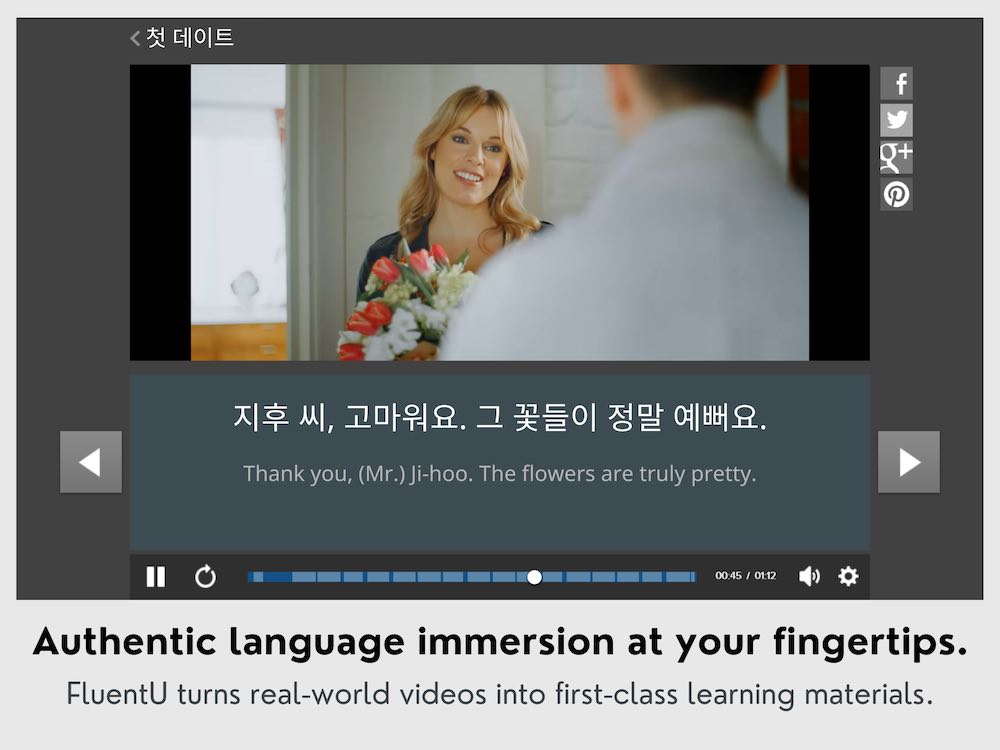Contents
- 1. “Jung_E” (2023)
- 2. “The Point Men” (2023)
- 3. “Project Wolf Hunting” (2022)
- 4. “Broker” (2022)
- 5. “Space Sweepers” (2021)
- 6. “Deliver Us from Evil” (2020)
- 7. “Minari” (2020)
- 8. “Extreme Job” (2019)
- 9. “Parasite” (2019)
- 10. “Burning” (2018)
- 11. “Little Forest” (2018)
- 12. “The Spy Gone North” (2018)
- 13. “Swing Kids” (2018)
- 14. “The Villainess” (2017)
- 15. “A Taxi Driver” (2017)
- 16. “Midnight Runners” (2017)
- 17. “On the Beach at Night Alone” (2017)
- 18. “The Wailing” (2016)
- 19. “The Handmaiden” (2016)
- 20. “Train to Busan” (2016)
- 21. “The Attorney” (2013)
- 22. “A Werewolf Boy” (2012)
- 23. “The Thieves” (2012)
- 24. “Silenced” (2011)
- 25. “The Man from Nowhere” (2010)
- 26. “Mother” (2009)
- 27. “The Chaser” (2008)
- 28. “The Good, the Bad, the Weird” (2008)
- 29. “Two Faces of My Girlfriend” (2007)
- 30. “The Host” (2006)
- 31. “Memories of Murder” (2003)
- 32. “Joint Security Area” (2000)
- Tips for Learning Korean from Movies
- And One More Thing...
Learn Korean with Movies: 32 Recommended Films

One of the best ways to learn Korean is through movies.
And the cool thing about learning Korean with films is that not only are they excellent language learning tools themselves, but they’ll pull you in with their cinematic brilliance.
So to help you take advantage, I’ve picked out 32 awesome movies to get you started—plus all the tips and tricks you will need to get the most out of these gems.
Download: This blog post is available as a convenient and portable PDF that you can take anywhere. Click here to get a copy. (Download)
1. “Jung_E” (2023)
Director: Sang-ho Yeon
Check for availability: Netflix
Legendary captain Yun Jung-yi fights to afford her daughter’s medical treatments in a post-apocalyptic Earth. After her death, her brain is cloned to develop an AI mercenary, Jung_E. Things don’t go according to plan, when the AI fails to perform in simulations of Jung-yi’s final mission. When attention shifts from developing combat robots to using them as household “appliances” for various purposes, the lead scientist plots an escape—with the AI in tow.
The sci-fi setting means you’ll hear lots of robot and tech vocabulary, but the human touch of the protagonists also leans into heartfelt and realistic discussions of what it means to be human.
2. “The Point Men” (2023)
Director: Soon-rye Yim
Check for availability: Viki
“The Point Men” is a gripping film based on a true story of the Korean hostage crisis in Afghanistan in 2007. The movie follows diplomat Jung Jae-ho and NIS agent Park Dae-sik as they attempt to rescue Korean hostages that have been abducted by the Taliban. The two take different approaches to the issue, with Jae-ho looking for a diplomatic solution and Dae-sik willing to take a more direct approach. As tensions rise, they face challenges and betrayals that put the hostages’ lives in peril.
This movie is chock-full of diplomatic vocabulary, words related to terrorism and negotiation phrases. It also features realistic teamwork and disagreements in a tense situation.
3. “Project Wolf Hunting” (2022)
Director: Hongsun Kim
Check for availability: Amazon, YouTube
A Busan prison detail is tasked with transporting four dozen hard criminals from Manila on a cargo ship. Things go south quickly when the prisoners stage a coordinated breakout. And when things seem like they couldn’t possibly get worse, the real threat appears: a berserker from the ship’s lower decks is unleashed on the ship’s passengers. This movie is intensely violent and bloody, and definitely not for the faint of heart!
The movie features lots of street slang, including coarse language. You’ll also hear a smattering of ship-related vocabulary.
4. “Broker” (2022)
Director: Hirokazu Koreeda
Check for availability: Hulu, YouTube
Ha Sang-hyeon, the owner of a laundry shop, and his friend Dong-soo run an unusual scheme: They steal babies from the local church “baby box” where unwanted children are left, and sell them on the black market. Things are going fairly well, until a young mother has a change of heart and returns to the church to reclaim her baby. The unlikely trio set out to interview the baby’s potential adoptive parents, with two detectives hot on their trail.
Common family and life vocabulary takes center stage in this surprisingly heartwarming drama.
5. “Space Sweepers” (2021)
Director: Jo Sung-hee
Check for availability: Netflix
In the year 2092, humanity faces a dystopian Earth and seeks refuge in space. A ragtag crew aboard a space junk collector ship discovers a humanoid robot that could be the key to salvation or destruction. Together, they embark on a thrilling adventure to decide the fate of humanity and themselves.
“Space Sweepers” offers a futuristic setting with a blend of action and drama. You’ll hear sci-fi vocabulary, providing an opportunity to explore advanced expressions and technical terms related to space and technology.
6. “Deliver Us from Evil” (2020)
Director: Hong Won-chan
Check for availability: Viki, Pluto, Tubi
In this intense action thriller, an assassin with a dark past becomes entangled in a dangerous mission when he’s hired to kill a retired contract killer. As the two lethal forces clash, secrets are revealed, leading to a high-stakes battle for survival and redemption.
Korean learners can delve into the intense world of action and suspense in this thrilling flick. You’ll be exposed to colloquial dialogues and a range of vocabulary related to the criminal underworld.
7. “Minari” (2020)
Director: Lee Isaac Chung
Check for availability: YouTube, Pluto, Tubi
“Minari” tells the heartfelt story of a Korean immigrant family trying to achieve the American dream in 1980s rural Arkansas. As they face both challenges and joys, the family finds strength in their determination to create a better life.
The movie offers a touching portrayal of family dynamics and the immigrant experience, with a rich dialogue that explores themes of identity, cultural adaptation and everyday life.
8. “Extreme Job” (2019)
Director: Lee Byeong-heon
Check for availability: Amazon, YouTube
A bumbling narcotics team goes undercover by opening a fried chicken restaurant to catch drug dealers, but their business unexpectedly takes off, leading to hilarious escapades and unexpected success.
Use this one to get immersed in everyday language used in business settings, culinary terms and comedic expressions.
9. “Parasite” (2019)
Director: Bong Joon-ho
Check for availability: Hulu, Amazon, YouTube
Bong Joon-ho’s masterpiece, “Parasite,” is a gripping social satire that revolves around the peculiar relationship between two families—one living in poverty and the other wealthy. Through a series of twists and turns, the movie delves into themes of class struggle, deception and the consequences of greed.
“Parasite” presents a rich tapestry of Korean language, from casual conversations to elevated dialogue, providing learners with an opportunity to explore complex social issues and nuanced storytelling.
10. “Burning” (2018)
Director: Lee Chang-dong
Check for availability: Viki, Pluto, Tubi
Based on a short story by Haruki Murakami, “Burning” is a psychological mystery that follows a young aspiring writer who becomes involved with a mysterious and wealthy man and his enigmatic girlfriend. As secrets unravel, the film explores themes of obsession, desire and existential uncertainty.
Korean learners can delve into the atmospheric world of “Burning,” where the film’s suspenseful and introspective nature allows for exposure to sophisticated vocabulary and emotional expressions.
11. “Little Forest” (2018)
Director: Yim Soon-rye
Check for availability: Tubi, Sling, Plex
In this heartwarming drama, a young woman returns to her rural hometown to escape the challenges of city life. Embracing the healing power of nature, she rediscovers herself through the joys of cooking and farming, finding solace in the simplicity of life.
You can savor the serene ambiance of “Little Forest,” while learning vocabulary about nature, agricultural terms and expressions related to self-discovery and contemplation.
12. “The Spy Gone North” (2018)
Director: Yoon Jong-bin
Check for availability: YouTube, Amazon, Google Play
Set during the 1990s, this espionage thriller follows a South Korean intelligence officer who infiltrates North Korea, assuming the identity of a businessman. As he navigates the complex world of politics and espionage, he becomes entangled in dangerous webs of deceit and loyalty.
“The Spy Gone North” offers a compelling narrative that delves into the intricacies of undercover operations and political intrigue. Listen out for formal dialogues and technical vocabulary.
13. “Swing Kids” (2018)
Director: Kang Hyeong-cheol
Check for availability: YouTube, Viki, Tubi
A group of prisoners of war at a South Korean internment camp find solace in their shared passion for dance, particularly swing. Amidst the backdrop of the Korean War, the protagonists embrace the rhythm of freedom and form an unlikely bond that transcends the constraints of war.
“Swing Kids” opens a window for Korean learners to explore themes of war with some dance-related terminology thrown in for good measure. You’ll also hear expressions and discussions of camaraderie, resilience and the pursuit of joy amid adversity.
14. “The Villainess” (2017)
Director: Jung Byung-gil
Check for availability: Pluto, Tubi, Sling
This action-packed thriller follows a skilled female assassin who seeks revenge against those who turned her into a weapon of destruction. As she faces betrayal and confronts her troubled past, the lines between good and evil blur in a whirlwind of adrenaline-pumping combat.
Korean learners can immerse themselves in the intense world of “The Villainess,” exploring action vocabulary, combat-related terms and the complexities of a strong female lead.
15. “A Taxi Driver” (2017)
Director: Jang Hoon
Check for availability: YouTube, Viki, Pluto
Based on a true story, this movie chronicles the experiences of a taxi driver who becomes an unwitting witness to the Gwangju Uprising in 1980. As he ferries a foreign journalist through the violent protests, he becomes deeply involved in the fight for truth and justice.
“A Taxi Driver” offers a powerful historical drama, providing insight into the social and political vocabulary related to protests, activism and human rights.
16. “Midnight Runners” (2017)
Director: Kim Joo-hwan
Check for availability: Viki, Tubi, Amazon
This action-comedy follows two police cadets who witness a kidnapping incident but find themselves ignored by their superiors. Determined to solve the case, they embark on a hilarious and wild journey to rescue the victim.
“Midnight Runners” offers a thrilling ride, full of police jargon and street slang.
17. “On the Beach at Night Alone” (2017)
Director: Hong Sang-soo
Check for availability: Amazon, Vudu, YouTube
This contemplative drama portrays the life of a young actress who spends time reflecting on her past relationship while wandering along a beach. Through poetic monologues and introspective scenes, the film delves into themes of love, loss and self-discovery.
“On the Beach at Night Alone” offers a meditative exploration of emotions and introspection, providing an opportunity to learn from expressive and philosophical expressions.
18. “The Wailing” (2016)
Director: Na Hong-jin
Check for availability: Viki, Pluto, Tubi
A police officer in a remote village investigates a series of mysterious and gruesome deaths. As he delves deeper into the supernatural occurrences, he confronts dark forces that challenge his understanding of reality.
“The Wailing” has a chilling atmosphere and explores supernatural vocabulary, expressions of fear and dialogues that capture the complexity of a psychological horror film.
19. “The Handmaiden” (2016)
Director: Park Chan-wook
Check for availability: Vudu
Set in 1930s colonial Korea, “The Handmaiden” is a provocative psychological thriller that revolves around a con artist posing as a handmaiden to a wealthy heiress. As their bond deepens, betrayal, desire and deception intertwine in a tale of cunning schemes and unexpected passion.
Korean learners can immerse themselves in the intricate plot of “The Handmaiden,” exploring historical vocabulary, formal language used in high society and expressions related to manipulation and intrigue.
20. “Train to Busan” (2016)
Director: Park Chan-wook
Check for availability: YouTube, Tubi, Viki, Pluto
In this intense zombie horror film, a group of passengers on a train to Busan must fight for survival as a deadly viral outbreak turns fellow travelers into bloodthirsty zombies. The struggle for survival unfolds within the confined space of the train, creating an adrenaline-fueled rollercoaster ride.
The movie gives you a chance to learn vocabulary related to disaster scenarios, survival tactics and expressions of fear and courage amidst chaos.
This video can get you started with learning verbs from “Train to Busan”:
21. “The Attorney” (2013)
Director: Yang Woo-suk
Check for Availability: YouTube, Pluto, Tubi
“The Attorney” follows a tax lawyer defending students rounded up on sedition charges, suspecting their confessions were extracted through torture. The film is based on the real “Burim Case” of 1981, where the lawyer defended 22 students accused of being North Korean sympathizers without proper warrants. His fight for justice turned him into a prominent human rights advocate and later the country’s 9th president.
This movie offers valuable legal, political and social vocabulary for language learners to comprehend news articles and understand Korean government affairs. Familiarizing yourself with such terms provides nuanced insights beyond standard language learning materials—plus, it’s just a great movie.
22. “A Werewolf Boy” (2012)
Director: Jo Sung-hee
Check for availability: Pluto, Tubi, Pluto
In this enchanting fantasy romance, a young girl moves to the countryside and discovers a feral boy with wolf-like characteristics living in the woods. As she takes him under her care and teaches him about the human world, an extraordinary bond forms, leading to a heartwarming and bittersweet tale of love and sacrifice.
This thoughtful film explores romance, the natural environment and vocabulary related to mythical creatures and folklore.
23. “The Thieves” (2012)
Director: Choi Dong-hoon
Check for Availability: Viki, YouTube, Pluto, Tubi
This heist movie features a team-up of Korean and Hong Kong crews, totaling 10 thieves, set on stealing the priceless $20 million “Tear of the Sun” diamond from a ruthless mob boss’s mistress. Pulling off such a daring feat is already challenging, but it becomes even more explosive thanks to personal agendas, lack of trust among thieves, double-crosses and betrayals.
The characters’ language is highly informal, bordering on slang, offering a rich source of dry conversational declarative sentences and question forms for language learners to study.
24. “Silenced” (2011)
Director: Hwang Dong-hyuk
Check for availability: Netflix
Based on a true story, “Silenced” is a harrowing drama that uncovers the horrifying abuse and exploitation of students at a school for the deaf. A dedicated teacher and a tenacious reporter join forces to expose the truth and seek justice, leading to a powerful narrative that sheds light on a disturbing social issue.
Korean learners can explore the emotional depth of “Silenced,” delving into legal vocabulary, investigative language and expressions of advocacy for social justice.
25. “The Man from Nowhere” (2010)
Director: Lee Jeong-beom
Check for availability: Viki, Pluto, Tubi
A reclusive pawnshop owner with a mysterious past becomes entangled in a dangerous web of crime when a young girl from the neighborhood is kidnapped. Determined to save her, he embarks on a relentless and violent journey through the criminal underworld.
“The Man from Nowhere” offers an action-packed adventure with exposure to gangster jargon, thriller-specific vocabulary and expressions of determination and vengeance.
26. “Mother” (2009)
Director: Bong Joon-ho
Check for availability: Tubi, Sling TV, Crackle
In this gripping thriller, a devoted mother sets out to clear her mentally challenged son of murder charges when he becomes the prime suspect in a heinous crime. As she uncovers shocking truths, the boundaries between maternal love and justice blur in a suspenseful and emotionally charged narrative.
Korean learners can immerse themselves in the emotional complexity of “Mother,” exploring legal terms, expressions of parental love and dialogues that challenge notions of right and wrong.
27. “The Chaser” (2008)
Director: Na Hong-jin
Check for availability: Tubi, YouTube
A former detective turned pimp races against time to find his missing girls after suspecting that a serial killer is targeting them. The suspenseful chase unfolds as he discovers the horrifying truth behind the kidnappings.
This thrilling crime narrative provides exposure to detective terminology, criminal investigations and expressions of urgency and suspense.
28. “The Good, the Bad, the Weird” (2008)
Director: Na Hong-jin
Check for availability: Tubi, YouTube, Apple TV
Set in 1930s Manchuria, this action-comedy follows three eccentric outlaws as they race to find a mysterious treasure map. The thrilling escapades lead to epic showdowns in the desert, culminating in an entertaining blend of adventure and humor.
Korean learners can enjoy the wild ride of “The Good, the Bad, the Weird,” while getting immersed in cowboy jargon, desert-themed vocabulary and colloquial expressions.
29. “Two Faces of My Girlfriend” (2007)
Director: Lee Seok-hoon
Check for Availability: Amazon, Viki
This light-hearted romantic comedy follows a 30-year-old man who encounters a wallet and discovers its owner, the beautiful and charming Ani. They become a cute couple and go on wonderful dates, but there’s a twist—Ani has a split personality and her aggressive and drunkard alter ego named Hani creates havoc in the relationship.
The movie offers a glimpse into everyday Korean dialogues, allowing viewers to listen and learn from the cadences, rises and dips of the melodious language in regular conversations.
30. “The Host” (2006)
Director: Bong Joon-ho
Check for Availability: Amazon
“The Host” shattered Korea’s box office records upon release and earned numerous awards, including Best Film in the 2007 Asian Film Awards. After 200 bottles of formaldehyde are dumped into Seoul’s Han River, a mutated monster emerges, leaving a trail of death and destruction. The film promises a rollercoaster of emotions—humor amidst chaos, bloody gore, suspense and vindication, as a father ventures into the monster’s lair to save his daughter.
“The Host” offers a wealth of colorful adjectives peppered throughout the script, providing conscientious language learners with vocabulary that adds nuance and vividness to their Korean.
31. “Memories of Murder” (2003)
Director: Bong Joon-ho
Check for availability: YouTube, Google Play, Apple TV, Amazon
Based on true events, “Memories of Murder” chronicles the desperate hunt for a serial killer preying on women in a small Korean town. As the bumbling local detectives and a dedicated investigator from Seoul join forces, they face mounting pressure to solve the heinous crimes.
The movie offers a gripping crime drama, providing exposure to investigative language, detective procedures and expressions of frustration and determination.
32. “Joint Security Area” (2000)
Director: Park Chan-wook
Check for Availability: Tubi, YouTube
This movie portrays the delicate peace between the two Koreas within the heavily fortified DMZ (Demilitarized Zone). After a South Korean soldier returns wounded, leaving two dead North Korean soldiers, the situation teeters towards military confrontation. An officer from the Neutral Nations Supervisory Commission steps in to investigate, unveiling the truth through insightful interrogations and flashbacks, revealing an unlikely friendship that blossomed in an improbable setting.
With an abundance of verbs, language learners, especially beginners, can benefit from watching this movie. The vivid context makes new words easier to remember.
Tips for Learning Korean from Movies
I know watching box office flicks may never be accepted in mainstream academia—I’ve made my peace with that—but as it turns out, there’s a definite goldmine in watching movies for language learning.
The advantage of Korean movies is that they provide the crucial context for language. As you may know, language is context hungry. Without it, language is scarcely meaningful. Throughout the movie, you will see nuanced and vivid examples of how language is wielded by its native speakers. You will understand vocabulary better because you will see it at work.
And because of this crucial context, words and phrases become highly memorable. They become stickier in the mind, giving the brain a lot to anchor on.
This type of “watching” isn’t passive. This is watching for language learning. As such, expect to go through the movie several times.
Here are some tips on how to actually learn Korean with films:
- Start with short clips. When you’re first getting started, a full movie might overwhelm you and cause you to lose focus. But short clips will keep you focused and able to study any new language you come across, which will help ease you into movies.
There are a lot of great places to turn to for these clips, such as FluentU.
FluentU takes authentic videos—like music videos, movie trailers, news and inspiring talks—and turns them into personalized language learning lessons.
You can try FluentU for free for 2 weeks. Check out the website or download the iOS app or Android app.
P.S. Click here to take advantage of our current sale! (Expires at the end of this month.)
- Watch like normal. Reserve the first screening for “normal” watching. See the movie for its own sake—no language lessons yet. Follow the subtitles and enjoy the film for its entertainment value. (You may repeat this as many times as you want.)
- Pay attention to English subtitles. In the second stage, that’s when you begin to focus your attention on the subtitles. Begin actively noticing the English subtitles and their corresponding Korean lines. Notice how some common Korean words are being translated into English. With paper and pen, keep a running initial list of “words of interest,” and check online to ensure you have a proper translation. It may be helpful to divide the movie into scenes or chapters so that you’re working with small, manageable chunks. (Work with one chapter at a time and watch it over and over.)
- Turn on Korean subtitles. When you feel confident and have that scene/chapter down pat, proceed to the third stage: using Korean subtitles. You now have Korean audio with matching Korean subtitles. (Review the scenes as many times as possible.) Hopefully, you also now have a decent memory of the English transcripts. Try adding to your list of “words of interest” and promptly find their meanings online.
- Read along aloud. Also in this Korean-only stage, try to read along aloud. Drill the dialogues and read along as the characters are delivering them. You don’t have to memorize lines, just get a feel for the words coming out of your mouth. Don’t be flustered if the characters are talking too fast; you’re not in competition with them.
- Turn off the subtitles. In the final stage, lose the subtitles and watch the scene/chapter normally, like a native speaker would. Notice that by this point, after numerous repetitions, your Korean is already in much better shape than the first time you watched the film. Now move on to the next chapter/scene and follow these stages again with the new content.
No matter which of these learning methods you use, watch the movie from start to finish without any subtitles once you finish drilling every chapter, and voila: You’re on your way to Korean mastery.
With these seven movies, you will definitely have a rich, nuanced and well-rounded vocabulary that can help you master Korean. So what are you waiting for? Head on to your favorite movie streaming site and get your Korean language workout today!
Download: This blog post is available as a convenient and portable PDF that you can take anywhere. Click here to get a copy. (Download)
And One More Thing...
If you enjoyed this post, you're already halfway to having the time of your life learning Korean with FluentU!
FluentU makes it possible to learn with K-pop videos, funny commercials, entertaining web series and more. Just a quick look will give you an idea of the variety of FluentU videos on offer:
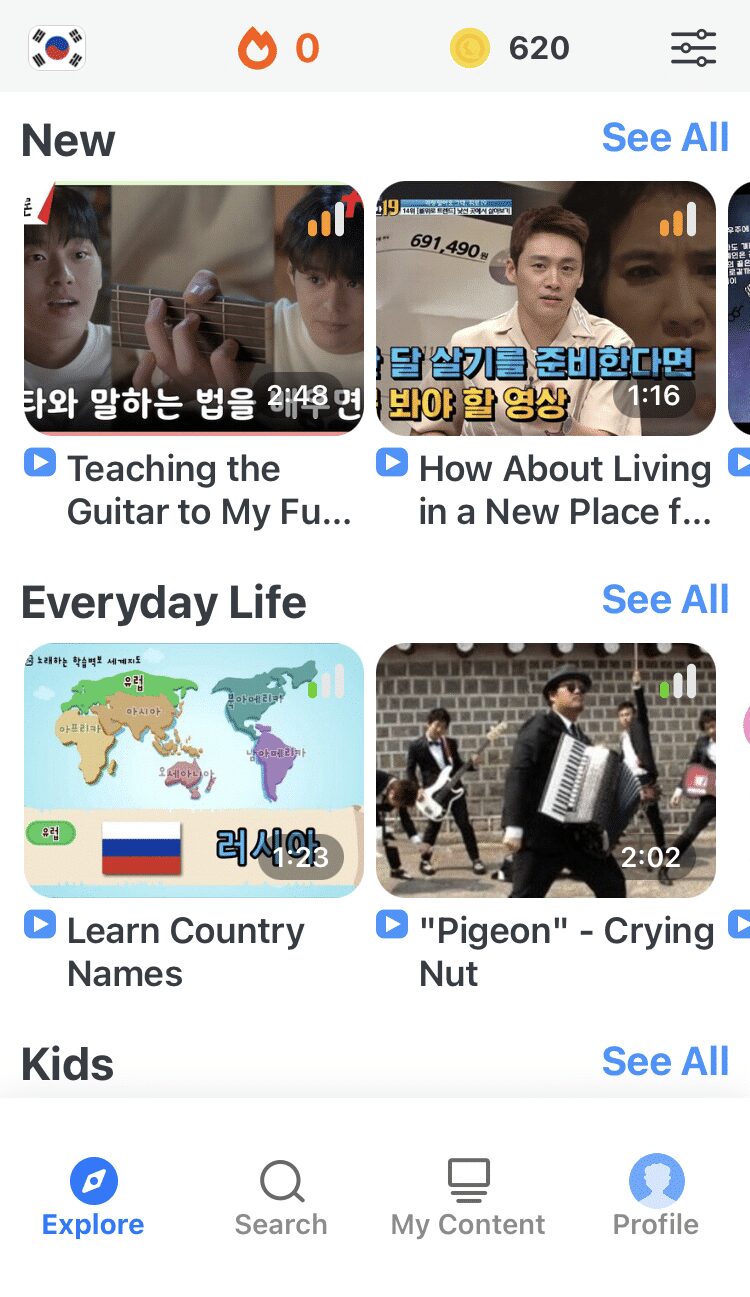
FluentU really takes the grunt work out of learning languages, leaving you with nothing but engaging, effective and efficient learning. It's already hand-picked the best videos for you (which are organized by level and topic), so all you have to do is simply choose any video that strikes your fancy to get started.
Each word in the interactive captions comes with a definition, audio, image, example sentences and more.
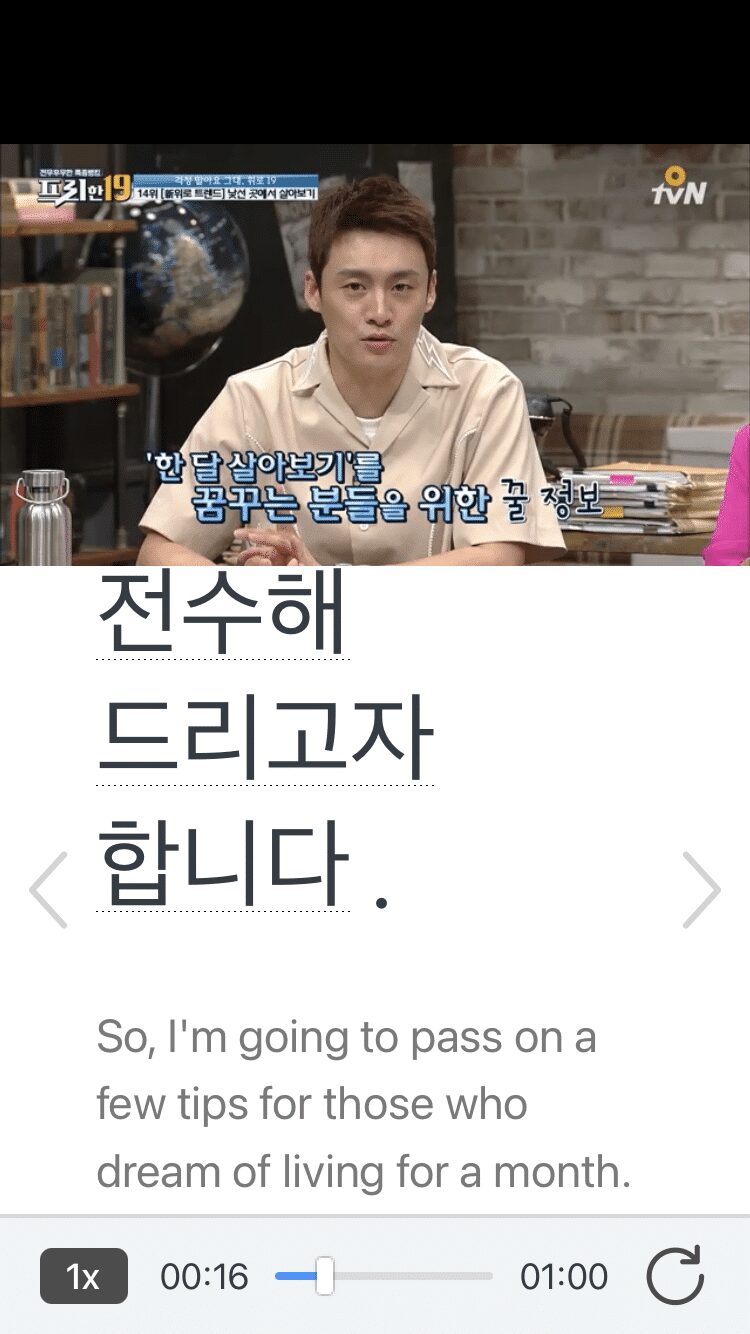
Access a complete interactive transcript of every video under the Dialogue tab, and easily review words and phrases from the video under Vocab.
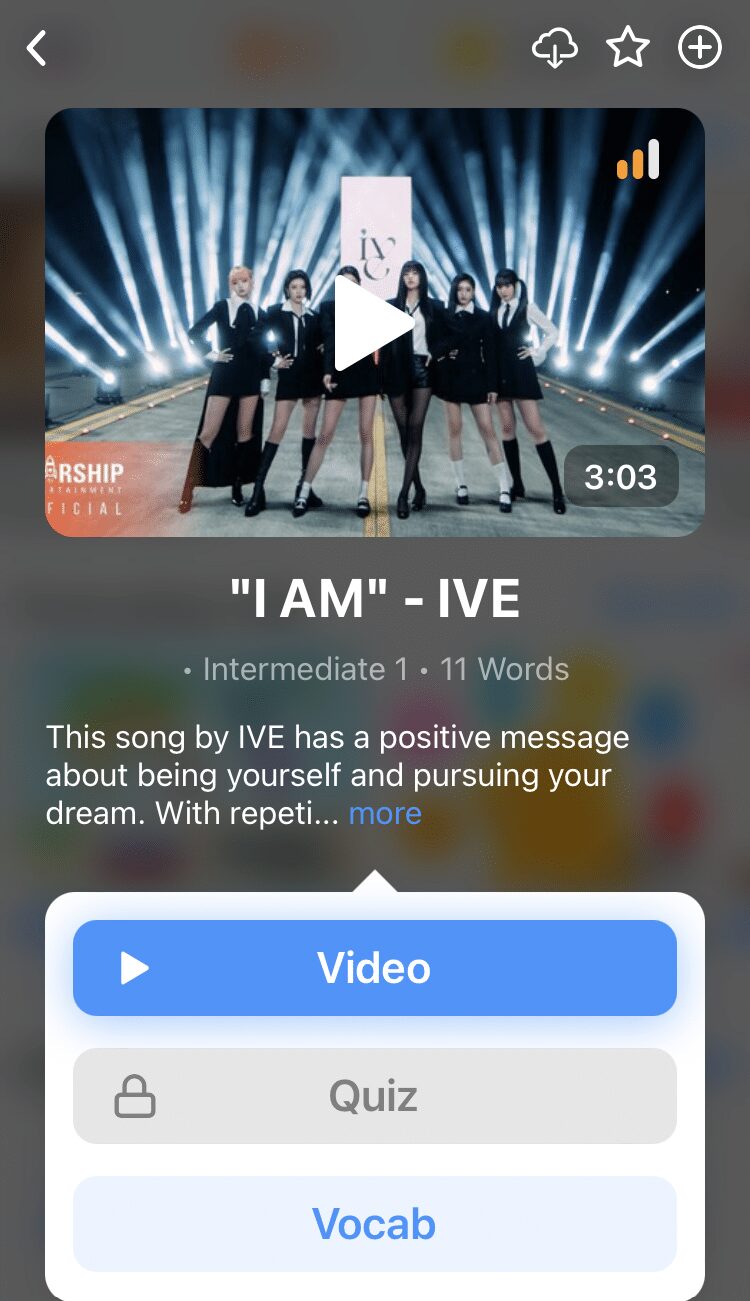
You can use FluentU’s unique Quiz Mode to learn the vocabulary and phrases from the video through fun questions.
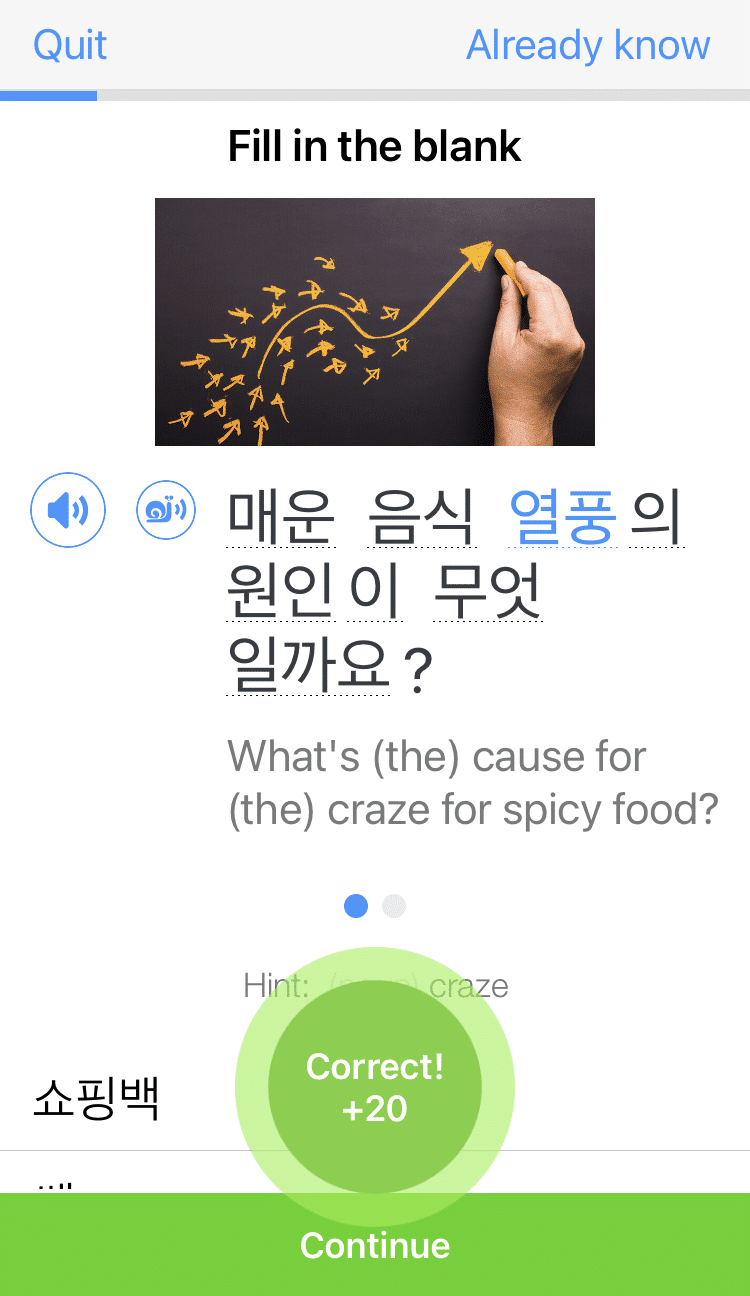
FluentU keeps track of what you're learning, and tells you exactly when it's time for review, giving you a 100% personalized experience.
Review sessions use video context to help embed the words in your memory.
Start using the FluentU website on your computer or tablet or, better yet, download the FluentU app from the iTunes or Google Play store. Click here to take advantage of our current sale! (Expires at the end of this month.)
